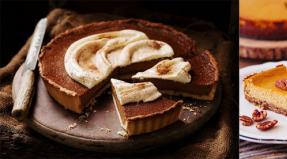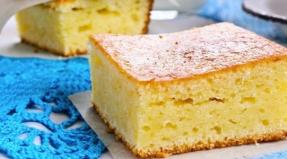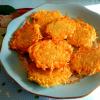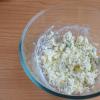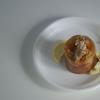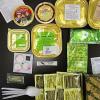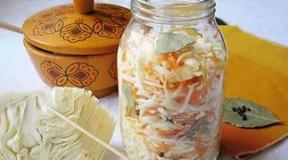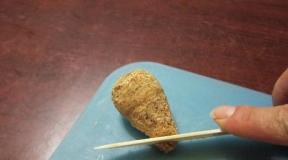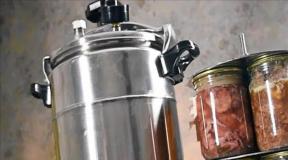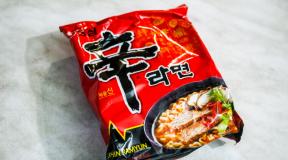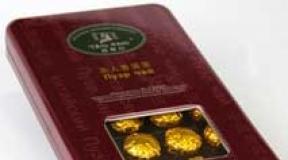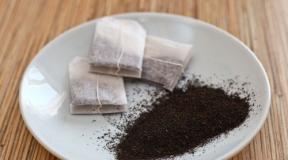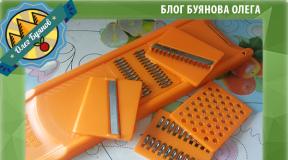Causes of pancakes sticking to the pan. Preheat the pan to the desired temperature
Consistency
Sometimes pancakes tear and stick due to the wrong dough consistency. It may turn out to be too liquid or, conversely, thick. An easy way to dilute thick dough is to add to it the liquid with which it was kneaded: water, milk, kefir, etc. And if the dough is too thin, try adding a little flour. All the ingredients in the dough should be at room temperature, and in order for its components to mix well, the dough should be allowed to stand for 15-20 minutes.
Milk
If pancakes are baked in milk (or kefir) alone, they often burn. In this case, you can add water to the dough. Dilute milk by a third or half with water.
Sugar
Sometimes the pancakes are not made due to the high amount of sugar. The pancake is already starting to burn from below, and the top does not have time to bake. And, when you have to turn such a pancake, it naturally breaks. So don't try to make the pancakes sweeter, but try to follow the recipe.
Pan
To prevent pancakes from sticking to the pan and tearing, experienced housewives recommend having a separate pan only for pancakes. Cast iron is desirable, but a good non-stick skillet will work as well. You only need to wash such a frying pan with water, without using dishwashing detergents and, especially, a dishwasher.

Temperature
The first pancake is often lumpy because the pan is not hot enough. Therefore, it is necessary to warm it up in advance and strongly, and then add oil and reduce the heat to medium.
Butter
The most common reason pancakes stick to the pan and break off is the wrong amount of oil. There should not be too much of it, the pancakes can burn from this, but it should not be too small, otherwise the pancakes will tear and stick to the pan.
- First, add 2-3 tablespoons of butter to the dough.
- Be sure to grease the pan after the 2nd or 3rd pancake, and if the pan is new, then after each.
- Remember to grease the sides of the pan, not just the bottom.
- There are now special brushes or spatulas for lubrication, but our mothers and grandmothers used improvised means. They pinned a half of an onion or potato onto a fork and use them to evenly distribute the oil over the pan.
- Instead of vegetable oil, experienced cooks recommend using a piece of bacon.
- If too much oil has accumulated in the pan, it must be removed. To do this, take a small spatula, wrap it with a napkin and secure with an elastic band.
shoulder blades

There are housewives who turn pancakes over with their hands, saying that this is the only way that pancakes do not break when turning over. The method is really convenient if you are not afraid of getting burned. Use a spatula to separate the edges of the pancake and then quickly turn it over with your hands. And so that it is not too hot, you can work with culinary gloves. If such an extreme option is not for you, use a wide, long-handled paddle.
Incredibly lucky for those who have a good old cast iron pancake pan. They are also called "grandmother's" pancake pan and nothing but pancakes is cooked on it. She has one purpose - to give out pancakes, pancakes and pancakes "on the mountain".
She does it conscientiously, serving more than one generation of the family. It is passed on by inheritance and does not ask questions why pancakes stick to the pan and are torn what to do.
If you want to feed your household pancakes often, visit grandmothers and aunts and try to beg for a cast-iron pancake pan from them if your family does not already have such a pan.
Coax the elderly relatives (they are the ones who have such pans, but they no longer have the strength to bake pancakes on them) and beg, exchange or buy rare utensils from them. Connect all your charm and try to become the owner of an old cast iron pancake pan.
In which pan is it better to fry pancakes
If you can't get an old cast iron pan for pancakes, you can buy a new cast iron pan and. You need to ensure that the surface of the pan becomes as smooth as a well-deserved pancake pan.
However, you should know that for decades the old cast-iron frying pan tightly clogged all the irregularities and pores of its surface with a natural non-stick film of boiling fats and oils, and the new one will have to undergo a "run-in" with time and proper initial processing.
Even if you prepare it correctly the first time, it will take time for the pancakes to stop sticking on it, and you forget about the painful question of why the pancakes stick to the pan and are torn what to do with this upsetting fact.
Since not a single frying pan has been able to surpass cast-iron pans in pancake-making, we will now talk about what needs to be done with a pancake pan so that the pancakes "jump off" from it, do not stick and break during baking.
How to prepare a new cast iron skillet

So, what needs to be done with a new cast-iron pancake pan in order to get a helper in the family - a pancake maker.
You need to buy a cast iron frying pan from a trusted manufacturer. A Chinese frying pan will not work for one single reason - we need high-quality, preferably domestic cast iron, from which our new frying pan is made.
The pancake pan should have low sides. It is more convenient to turn pancakes in such a pan with a spatula, fork or knife. They will not tear and “clump” during the baking process.
- Our ugly, black or gray purchase must first be washed from the technical oils that cover the finished cast-iron dishes at the factory so that it does not rust during storage and transportation to the counter.
- Then wipe dry and put it on fire. Heat it properly, and pour a little (A little! Just a few tablespoons) of vegetable oil on it.
If the pan is too hot and you pour oil on it in a trickle, it will immediately boil and begin to spray and “shoot” in all directions. Not only are these splashes of hot oil digging into furniture and walls and are difficult to clean, but there is a risk of severe burns. Be careful and careful!
- Move a safe distance from the pan and brush the entire inner surface of the pan with a silicone brush or other grease so that the hot oil is applied everywhere, including the sides of the pan.
- The heated oil will firmly clog the pores of the new cast iron skillet for a natural, non-stick finish. The very desired "smoothness", which ensures the "jumping off" of pancakes from the pan during baking. This is the advantage of cast iron cooking utensils, coupled with the uniformity of heating and excellent heat transfer of cast iron.
- Turn off the heat and let the skillet cool down. After using paper (paper for printers) or thick napkins, carefully wipe the entire surface of the pan from oil.
- It is advisable to repeat the previous operation several times.
Do not forget to ventilate the kitchen, open windows or do it in the country. Oil, burning out - smokes.
Before frying pancakes, pour salt into the pan in a layer of two to three centimeters and heat it until light brown. Then shake out the salt and wipe the pan well with paper again. You do not need to wash the pan after that. The procedure we have described is called baking a new cast iron skillet.

We can assume that the new cast iron skillet is ready for work. How diligently you carry out this first processing of a new pan will determine how quickly and easily you will cope with frying pancakes in the future.
By the way, it takes a long time to describe the process of preparing a new cast-iron frying pan. In fact, for all these dances around the purchase, half an hour is enough.
Old cast iron pan - what to do with it
A frying pan on which pancakes are fried or baked is exactly half of the success and a guarantee that ruddy pancakes will quickly grow in a heap on a plate and homemade ones will be able to taste delicious pancakes. But what to do with an old frying pan that you got not in perfect condition? Even if an old pancake pan is covered with rust, it can be reanimated.
For this, it is better to go to the men in the garage or workshop. They know better how to get rid of rust on metal. For instance:
- To remove rust with a metal brush-attachment on a drill.
- Soak in oil.
- Burn over the fire. Blow torch or on the coals of a fire.
Attention!
Fire burning should only be done by an experienced person. Otherwise, there is a great risk of getting a cracked frying pan, which will only need to be thrown away.
Reanimating an old cast iron pancake maker

Based on the degree of neglect of the pan, we decide how to make it a pancake helper. You can use a method of applying your own paste to the surface, which will facilitate its further cleaning.
- 1/2 cup baking soda
- 1 teaspoon dishwashing liquid
- 2 tablespoons of hydrogen peroxide
Stir until it looks like whipped cream (add more peroxide if necessary),
apply on a dirty surface and leave for 10 minutes.
After that, we take a hard sponge, three thoroughly and clean the softened carbon deposits along with rust. It is better to involve a man in this business. Although not too physically hard work, it is more convenient for a man. And it is more useful for our hands.
The next step is to repeat all the operations for calcining the salt in the pan and rubbing it with paper. The first pancake can stick, the next ones will easily turn over.
For greasing, we use a piece of unsalted bacon on a fork or gauze oiled with vegetable oil. For ease of use, it is tightly wound on a long stick or fork.
If vegetable oil is added to the pancake dough, it is not possible to grease it before each portion of the pancake dough. But this needs to be discussed separately.
Pancake dough is the second half of success. In order for the pile of ruddy pancakes to grow quickly and sportively, there are two components: a frying pan and dough. Well, and also the dexterous hands of a skilled mistress. But this comes with experience.
If there is no good pancake pan in the house, the acquisition of this experience is greatly delayed and overshadowed by spoiled dough and mood. The tried-and-true cast iron pancake pan eliminates the very question of why pancakes stick to the pan and break.
There are no people in the world who would not like pancakes. Hand-made pancakes are an indicator of the hostess's skill. However, there are times when making pancakes is disappointing. Inexperienced housewives often ask why pancakes stick to the pan all the time, tear and do not turn out beautiful? There can be several explanations for this, let's figure out how to avoid this problem.
Why pancakes stick to the pan - reasons
So that the pancakes do not stick to the pan, follow exactly the recipe and observe the ratio of products
- It is better not to substitute special flour for pancakes with regular wheat flour. Otherwise, you may not end up with thin pancakes, but pancakes.
- It is recommended to dilute the pancake dough with warm milk or water so that the pancakes do not stick to the pan. When you use cold ingredients, you will have difficulty breaking the lumps in the dough. Liquid that is too hot will also harm the taste of your pancakes.
- The finished pancake dough is similar in density to watery sour cream. If it "stretches" for a spoon, add water so that the pancakes do not stick to the pan.
- Be sure to leave the dough in the room for an hour before starting cooking so that all the ingredients are thoroughly dissolved in each other.
- Don't put too many eggs and sugar in the dough. Sugar will make your pancakes tear. And because of the large number of eggs they will become "rubbery" and tasteless.
Cooking tricks to keep the pancakes from breaking
- To prevent your pancakes from sticking to the pan and baking quickly, add a few tablespoons of refined vegetable oil to the dough.
- It is recommended to turn pancakes with a narrow sharp spatula.
- Before frying, it is necessary to grease the pan with pickled cucumber so that the pancakes do not stick to the pan and do not break. To make the pancakes stick well from the pan, you can fry the salt on it. Starting to fry pancakes, brush it with a piece of bacon or vegetable oil using a brush.
What to do if the pancakes tear and stick to the pan - tips

There should be a separate pan for pancakes. This means that other dishes cannot be cooked on it, so that the pancakes do not stick later. It is intended exclusively for making pancakes. A cast iron skillet is ideal. In general, it is believed that it is cast iron that does not pose a danger to our body. Warm up the pan thoroughly before starting the baking process. This is one of the golden rules for making pancakes so that they don't break.
Always add butter to the dough to keep the pancakes from tearing and sticking to the pan. And the pan should also be lubricated with vegetable oil and not in a single version. Grease it at least 3 times throughout the baking process.
Often the problem that pancakes tear and stick is not quite thick dough. Always try to make the dough thicker. Of course, we understand that thin pancakes will not work from thick dough, but, nevertheless, they will be perfect. Don't be greedy about flour, add as much of it as possible. But in everything there is a measure, so do not overdo it.
As mentioned in the paragraph above, in order to prevent the pancakes from sticking to the pan, you need to grease the pan with oil. But this is not always an effective way. Many housewives recommend baking them in a dry frying pan. If you decide to bake pancakes in vegetable oil, try to grease the pan after each use.
In general, there are many tips on what to do if pancakes stick to the pan. We have provided you with just a few of them. But believe me, knowing them, you will definitely bake good pancakes, and they probably will not stick to the pan. We hope the topic - "Why do pancakes stick to the pan" is fully disclosed. Finally, I would like to remind you that "the first pancake is always lumpy." Therefore, if the pancakes turned out to be not entirely successful, do not be upset! In the future, the trend will change only in a positive direction. Experiment and use our tips.
What to do if pancakes stick and break - Video recommendations
Typical mistakes of young housewives when baking pancakes
Insufficiently heated or dirty pan.
For baking pancakes, you need to take a cast iron or aluminum frying pan. The pan must be well washed and calcined with salt. A dirty surface can be the reason why the pancakes stick to the pan. It is very important to preheat the pan well before baking. For pancakes, it is better to have special cooking utensils and not use them for other purposes. For example, if meat was fried before, then it is very difficult to clean the surface of the pan and the pancakes will not be removed well.
Dry skillet (little oil)
For 1 pancake, you need to use at least 1 tablespoon of vegetable oil. On a dry surface, the dough will burn and stick.
There are few eggs in the dough
Many inexperienced housewives complain that "pancakes break when turning over", but they save eggs. But it is this ingredient that serves to glue the dough.
"Important! For good pancakes, put at least one egg in a glass of flour. "
The dough is thin or thick
To prepare the dough, first mix the eggs with a little water and a pinch of salt. Gradually add flour there and rub with a spoon. At the first stage, the dough should be like thick sour cream. This will help you grind the lumps well. Then gradually add water to the dough to make it look like thick milk.
“The secret of the hostess. You need to turn the pancakes with a wide metal spatula. "
The dough has not settled
In order for the flour to completely dissolve and the pancakes to turn over well, you need to put the finished dough for half an hour to stand.
Baking the simplest and most delicious pancakes
Components for the dough (portion 10 pieces)
- eggs - 1 pc.;
- flour - 10 tablespoons;
- water - about 1.5 cups. The dough is diluted with water as needed;
- salt - 1 pinch.
Prepare the dough in the way indicated above. For baking, place a skillet over medium heat and heat well. For one pancake, you need to use 1 tablespoon of sunflower oil. Spread it evenly over the surface of the pan. Pour the dough with a ladle, a thin layer and bake. Flip it over to the other side with an iron spatula or knife. For each next pancake, you need to pour 1 tbsp again. spoon of oil. Then it will be soft and ruddy.
The first pancake you have will be experimental. When baking, you will see what the dough is.
The pancakes need to be flipped a couple of times to get a good browning. Fold the pancakes in four or in a stack so they won't dry out.
Why do pancakes stick to the pan despite your best efforts, and how do you end it? Change the pan? Find another recipe? Or maybe come to terms with the fact that pancakes are not yours and, as in a joke, continue to bake lumps? Calm down! There is a solution for every problem, and even more so for the culinary one. On your side is the centuries-old experience of housewives who have cooked ruddy round "suns" in Russia since time immemorial. They already knew what to do!
The first pancake is not lumpy
Why do pancakes stick? Most likely, you made a mistake in one of five points:
- did not guess with the choice of the pan;
- poorly warmed it up;
- incorrectly lubricated;
- confused with the recipe;
- forgot to be patient. Also, by the way, an important thing when baking pancakes!
Let's start working on the bugs?
The subtleties of choosing a pancake pan
In the old days, every self-respecting housewife in the kitchen kept an old great-great-great-great-grandmother cast iron pan for pancakes. It was never washed, wiping clean with a piece of paper or a cloth, and under no circumstances was it used to prepare other dishes. And there were reasons for that.
- A pan for baking pancakes should warm up quickly and evenly, and also keep it warm. And cast iron meets these requirements 100%.
- It is desirable that it be made of a porous metal that can absorb and accumulate oil during frying, which reduces the likelihood of scorching the dough. And again, cast iron is out of competition here.
- Over time, an invisible oil film forms on the bottom of the dish, which makes it easier for the hostess to work, and does not allow the cast iron to rust. That is why the pans that wander in the family from generation to generation enjoy special respect among true cooks, and for the same reason they try not to wash them again. But pancakes are one thing, and eggs and potatoes are another. At this point, you can't do without Fae and a hard brush, which means goodbye to the protective film.
What can you do to prevent the pancakes from sticking to the new frying pan if mom and grandmother have not saved a cast-iron rarity for you? Densely cover the bottom of your purchase with salt, heat it over medium heat until the grains acquire a dark creamy hue, gently shake the salt into the sink with a napkin and start baking - the metal will be perfectly calcined and ready to show its best.
In addition to cast iron, which has no competitors in the baking business, chefs are recognized by:
- titanium - by the properties of the native "twin brother" of cast iron;
- aluminum, the only drawback of which is fragility;
- teflon coated steelcomfortable, but delicate handling;
- ceramics, environmentally friendly, although it does not tolerate temperature changes;
- marble - almost perfect material, if not for the exorbitant cost.

Why do pancakes stick to the frying pan, although you were very serious about choosing it and were not too lazy to ignite a bowl of salt? Perhaps the point is in the high side, which makes it difficult to freely wield the scapula. In a professional pancake pan, it does not exceed 2, and sometimes even 0.5 cm.
Give it a spark
Why does the first pancake often come out lumpy? Because inexperienced housewives begin to bake it in an unheated frying pan, while true craftswomen with a sixth sense determine when it is time to overturn the first ladle of dough on the hot bottom.
Drop a couple of drops of water on the bottom and see how they behave. If they evaporate with a hiss, it's time to move on to the second stage and grease the pan with oil. As soon as the characteristic transparent "smoke" begins to rise from it, it's time to take up the ladle. Well, if instead of butter you use bacon, wait until the piece touches the red-hot metal starts to heat up from the heat and get down to business.
Nuance: it is the haze that should be expected, not the child, so do not try to make the fire bigger. A medium flame is more than sufficient.
Oil oil

If, frightened by talk about carcinogens, you diligently save on oil, do not wonder why pancakes stick to the pan and break.
- Firstly, vegetable oil must be included in the recipe for good pancakes. And if it is not included, without a shadow of a doubt add it yourself - 1-2 tablespoons.
- Secondly, you need to grease the pan with oil. At least before baking the first pancake, and more often before every 3-4. It is even recommended to lubricate the Teflon coating - for fidelity and a more pleasant taste of the finished meal.
- Thirdly, immediately forget about butter and margarine, they are not your helpers. The only alternative to vegetable oil is lard.
- Fourth, do not be too lazy to grease the sides of the pan. They are often forgotten, but meanwhile, the dough can stick to the sides just as well as to the bottom, thereby ruining all your baked goods.
- Fifth, know when to stop. Pancakes floating in a boiling puddle of oil turn out to be little better than those tried to cook in a dry pan.
Hope for the recipe, but do not make a mistake yourself

But what if the pancakes stick to the pan not because of its material or lack of oil - what to do in this case?
- Check the thickness of the dough. It should resemble liquid sour cream or cream, otherwise burning cannot be avoided. And do not nod at the recipe, where the ratio of all products is written in black and white! You and its author could use different types of flour, so there was a slight error. If the dough is thick and viscous, add water or milk to it, if it is too thin, thicken it with flour.
- Don't overdo it with sugar. It will settle to the bottom, brown and firmly adhere to the metal.
- Measure the baking soda clearly. Its excess reduces the stickiness of the flour, which is why the pancakes begin to fall apart right on the shoulder blade.
- But do not spare the eggs. They will serve as a link and make the baked goods stronger.
- If you are kneading the dough with kefir or milk, be prepared for additional difficulties, since such a delicacy turns out to be very tender and turns over worse. You can help by replacing part of the dairy products with water, adding another egg to the dough and armed with a thin and wide spatula. Chubby silicone, of course, Teflon will not scratch, but it is more difficult to pry a pancake with them.
In a hurry, you make people laugh

You will need patience at least three times. For the first time, when you collect products for pancakes: you need to leave them on the table and let them warm to room temperature. It is undesirable to knead dough from cold milk and eggs.
The second time you have to lose 15-30 minutes to give the finished dough "rest" on the table under a towel. During this time, the gluten will swell, and the pancakes will become fluffier and will not break during baking.
The third time, you will need patience to wait for the pan to heat up. But we have already talked about this.
If all the rules are followed, the chances of enjoying rich and ruddy pancakes will increase significantly.
Video: 7 secrets of pancakes are not lumpy
It seems that we forgot to mention the main condition for baking the right pancakes: a good mood of the hostess. Tune in fighting and get down to business with a smile, without this, both the cast-iron pan and the oil will be powerless.
